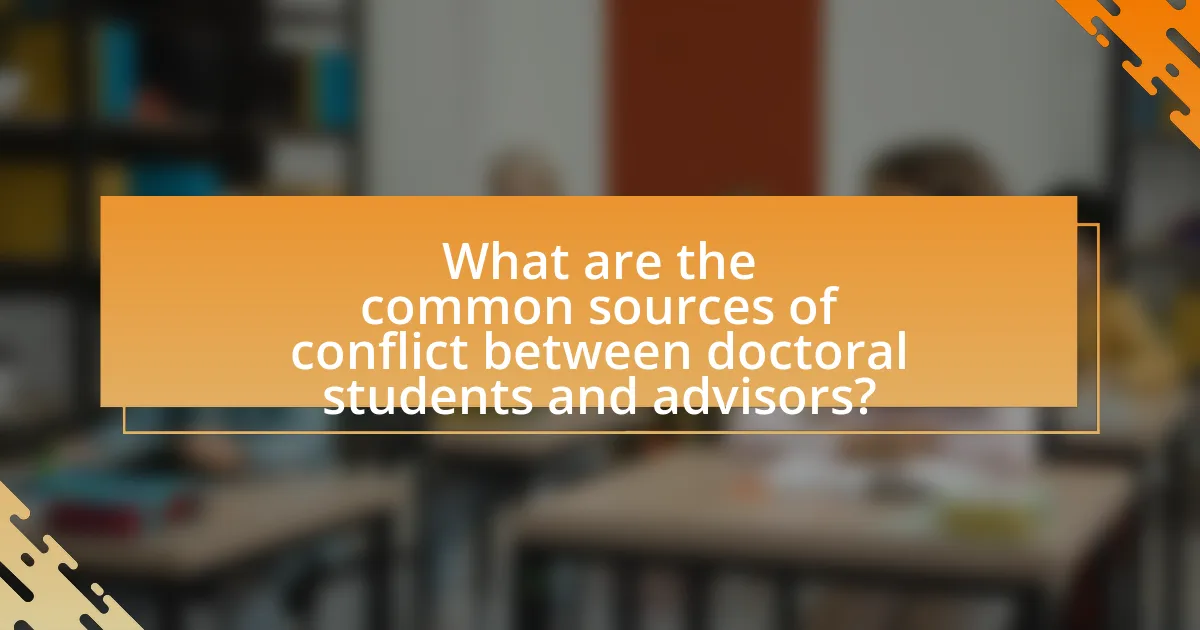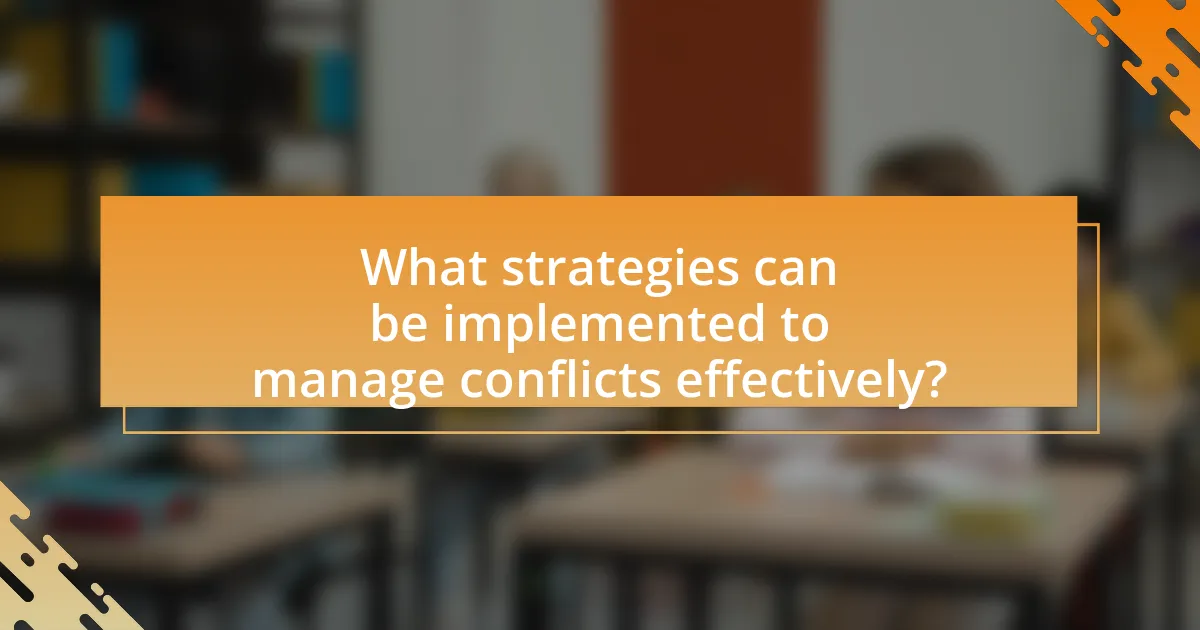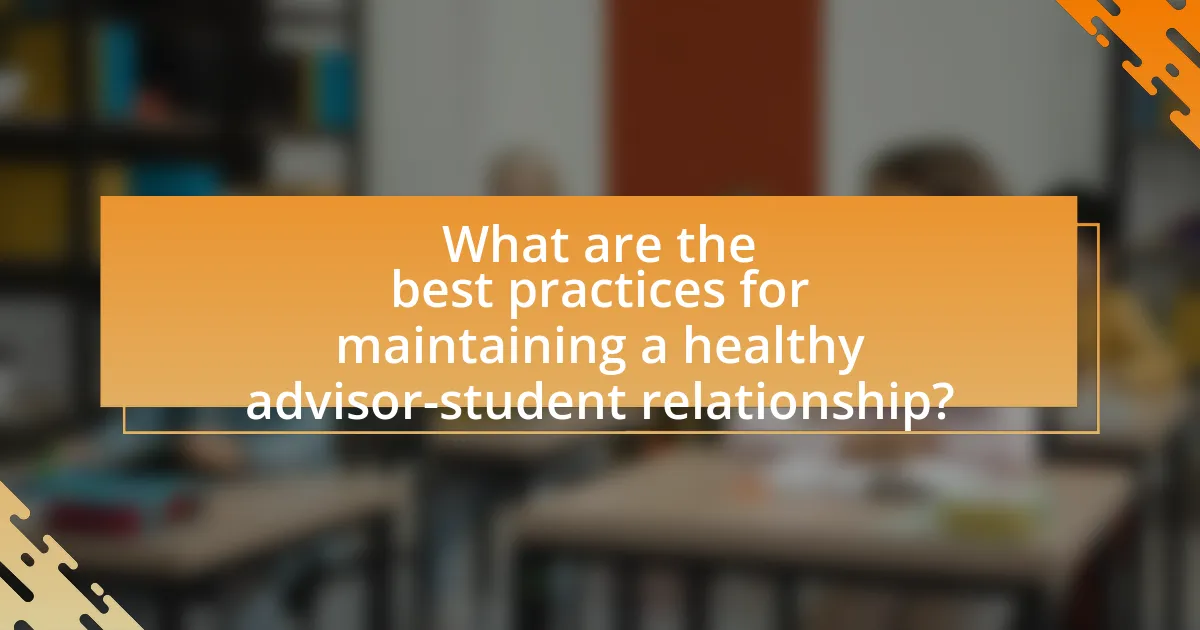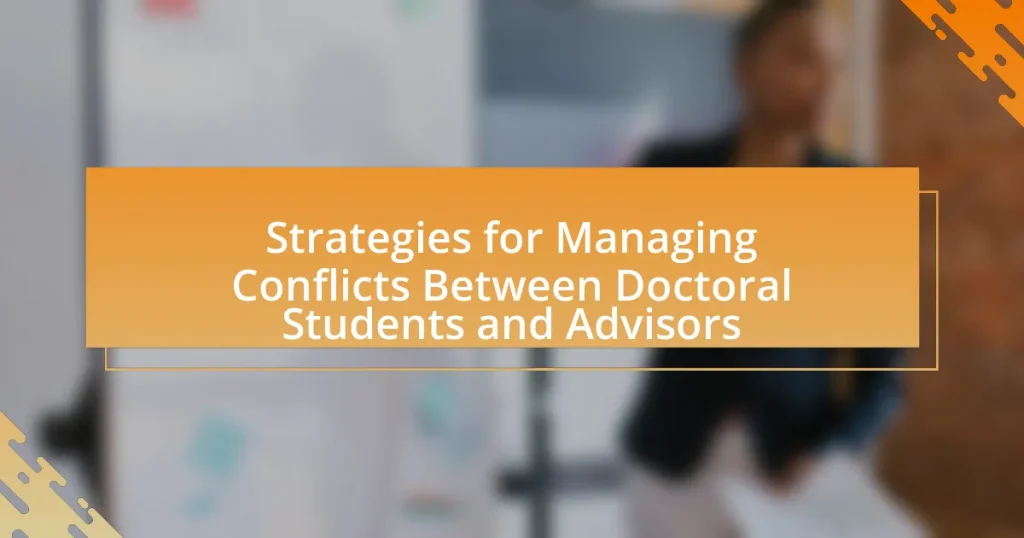The article focuses on strategies for managing conflicts between doctoral students and their advisors, highlighting common sources of conflict such as differing expectations, communication issues, and varying levels of commitment. It examines how misaligned expectations and communication barriers can escalate tensions, and discusses the role of personality in shaping advisor-student dynamics. The article also outlines effective conflict resolution techniques, including open communication, active listening, and setting clear boundaries, while emphasizing the importance of mutual respect and constructive feedback in fostering a positive advisor-student relationship. Additionally, it provides practical tips for navigating difficult conversations and accessing resources for conflict management in academic settings.

What are the common sources of conflict between doctoral students and advisors?
Common sources of conflict between doctoral students and advisors include differences in expectations, communication issues, and varying levels of commitment to the research project. Differences in expectations often arise when advisors have specific goals for the student’s progress that the student may not fully understand or agree with. Communication issues can stem from unclear feedback or infrequent meetings, leading to misunderstandings about project direction. Additionally, varying levels of commitment can create tension, particularly if the advisor perceives the student as not dedicating enough time or effort to their research. These conflicts can significantly impact the student-advisor relationship and the overall success of the doctoral journey.
How do differing expectations lead to conflicts?
Differing expectations lead to conflicts by creating misunderstandings and misalignments between parties involved. In the context of doctoral students and advisors, when a student’s expectations regarding guidance, feedback frequency, or project direction differ from the advisor’s expectations, it can result in frustration and dissatisfaction. For instance, a study by Lee and Green (2016) in the “Journal of Higher Education” found that mismatched expectations regarding communication styles and academic goals were significant sources of conflict in advisor-student relationships. This evidence illustrates that when expectations are not aligned, it can lead to a breakdown in communication and trust, ultimately resulting in conflict.
What specific expectations do doctoral students have of their advisors?
Doctoral students expect their advisors to provide guidance, support, and constructive feedback throughout their research journey. Specifically, they anticipate regular communication, mentorship in research methodologies, and assistance in navigating academic and professional development. Research indicates that effective advisor-student relationships significantly impact student satisfaction and success, with studies showing that 70% of doctoral students value timely feedback and availability from their advisors as crucial to their progress.
What specific expectations do advisors have of their doctoral students?
Advisors expect their doctoral students to demonstrate independence in research, effective communication skills, and a commitment to their academic progress. Specifically, advisors anticipate that students will proactively engage in their research projects, seek feedback, and communicate regularly about their progress and challenges. This expectation is supported by studies indicating that successful doctoral students often exhibit self-motivation and the ability to articulate their research goals clearly, which fosters a productive advisor-student relationship.
Why do communication issues arise in the advisor-student relationship?
Communication issues arise in the advisor-student relationship primarily due to differences in expectations and communication styles. Advisors often have specific academic and professional expectations that may not align with the student’s understanding or goals, leading to misunderstandings. Additionally, varying levels of experience and familiarity with academic norms can create barriers; for instance, a student may not feel comfortable approaching their advisor with questions or concerns, resulting in a lack of open dialogue. Research indicates that effective communication is crucial for successful mentorship, and when advisors and students do not engage in regular, clear communication, it can exacerbate conflicts and hinder academic progress.
What are the common communication barriers faced by doctoral students and advisors?
Common communication barriers faced by doctoral students and advisors include differences in expectations, lack of clarity in communication, and emotional factors. Differences in expectations often arise from varying understandings of roles and responsibilities, leading to misalignment in goals. Lack of clarity in communication can stem from complex academic language or insufficient feedback, which hinders effective dialogue. Emotional factors, such as stress and anxiety, can also impede open communication, making it difficult for both parties to express concerns or seek clarification. These barriers can significantly impact the advisor-student relationship and the overall progress of the doctoral journey.
How can miscommunication escalate conflicts?
Miscommunication can escalate conflicts by creating misunderstandings that lead to frustration and resentment. When doctoral students and advisors fail to clearly convey expectations or feedback, it can result in misaligned goals and perceived slights. For instance, a study published in the Journal of Higher Education found that unclear communication between students and advisors often leads to increased anxiety and conflict, as students may feel unsupported or undervalued. This cycle of miscommunication can perpetuate negative feelings, ultimately intensifying the conflict and hindering the academic relationship.
What role does personality play in conflicts between doctoral students and advisors?
Personality significantly influences conflicts between doctoral students and advisors by shaping communication styles, expectations, and interpersonal dynamics. For instance, students with high levels of neuroticism may experience anxiety and misinterpret feedback, leading to misunderstandings with advisors who may have a more assertive or direct communication style. Research indicates that personality traits, such as agreeableness and openness, can either mitigate or exacerbate conflicts; agreeable individuals are more likely to seek collaborative solutions, while those high in openness may challenge authority, creating tension. A study by Duffy et al. (2019) published in the Journal of Educational Psychology highlights that mismatched personality traits between students and advisors can lead to increased conflict and dissatisfaction in the mentoring relationship.
How do different personality types affect the advisor-student dynamic?
Different personality types significantly influence the advisor-student dynamic by shaping communication styles, expectations, and conflict resolution approaches. For instance, an advisor with a dominant personality may prefer direct communication and quick decision-making, which can clash with a student who has a more analytical personality that values thorough discussion and reflection. This mismatch can lead to misunderstandings and frustration. Research indicates that personality compatibility, such as aligning extroverted advisors with similarly extroverted students, often results in more effective collaboration and satisfaction in the advisor-student relationship. Additionally, studies show that awareness of personality differences can enhance conflict management strategies, allowing both parties to adapt their approaches for better outcomes.
What strategies can be employed to bridge personality differences?
To bridge personality differences, effective strategies include fostering open communication, practicing active listening, and establishing common goals. Open communication allows individuals to express their thoughts and feelings, reducing misunderstandings. Active listening ensures that each party feels heard and valued, which can mitigate conflicts arising from personality clashes. Establishing common goals aligns the interests of both parties, creating a collaborative environment that transcends individual differences. Research indicates that teams with clear, shared objectives experience improved cohesion and performance, highlighting the importance of this strategy in managing conflicts effectively.

What strategies can be implemented to manage conflicts effectively?
Effective strategies to manage conflicts include open communication, active listening, and establishing clear expectations. Open communication fosters an environment where both parties can express their concerns and viewpoints without fear of retaliation. Active listening ensures that each party feels heard and understood, which can de-escalate tensions. Establishing clear expectations regarding roles, responsibilities, and timelines helps prevent misunderstandings that often lead to conflicts. Research indicates that these strategies can significantly reduce conflict occurrences and improve relationships, as evidenced by studies showing that effective communication and clarity in expectations lead to higher satisfaction in academic settings.
How can open communication be fostered between doctoral students and advisors?
Open communication between doctoral students and advisors can be fostered through regular, structured meetings and the establishment of clear expectations. Regular meetings create opportunities for students to discuss their progress, challenges, and feedback, while clear expectations help both parties understand their roles and responsibilities. Research indicates that effective communication practices, such as active listening and providing constructive feedback, significantly enhance the advisor-student relationship, leading to improved academic outcomes and reduced conflicts. For instance, a study published in the Journal of Higher Education found that students who engaged in frequent communication with their advisors reported higher satisfaction and better academic performance.
What techniques can improve active listening in the advisor-student relationship?
Techniques that can improve active listening in the advisor-student relationship include paraphrasing, asking open-ended questions, and providing non-verbal feedback. Paraphrasing allows the advisor to confirm understanding by restating what the student has said, which fosters clarity and encourages further dialogue. Asking open-ended questions invites students to elaborate on their thoughts and feelings, promoting deeper engagement. Providing non-verbal feedback, such as nodding or maintaining eye contact, signals attentiveness and encourages students to share more openly. These techniques enhance communication and help build a trusting relationship, which is essential for effective conflict management between doctoral students and advisors.
How can regular check-ins prevent misunderstandings?
Regular check-ins can prevent misunderstandings by facilitating open communication between doctoral students and advisors. These scheduled interactions allow both parties to clarify expectations, address concerns, and provide feedback in real-time, reducing the likelihood of assumptions or misinterpretations. Research indicates that consistent communication improves relationship quality and decreases conflict, as evidenced by a study published in the Journal of Higher Education, which found that regular meetings significantly enhance clarity and alignment in academic settings.
What conflict resolution techniques are most effective in academic settings?
Effective conflict resolution techniques in academic settings include active listening, mediation, and collaborative problem-solving. Active listening allows parties to fully understand each other’s perspectives, fostering empathy and reducing misunderstandings. Mediation involves a neutral third party facilitating discussions, which can help clarify issues and guide parties toward a mutually acceptable solution. Collaborative problem-solving encourages all involved to work together to identify solutions that satisfy everyone’s needs, promoting a sense of ownership and commitment to the resolution. Research indicates that these techniques lead to more positive outcomes in academic conflicts, as they enhance communication and build trust among doctoral students and advisors.
How can mediation be utilized to resolve disputes?
Mediation can be utilized to resolve disputes by facilitating communication between conflicting parties to reach a mutually acceptable agreement. In the context of conflicts between doctoral students and advisors, mediation provides a structured environment where both parties can express their concerns and perspectives. Research indicates that mediation can lead to higher satisfaction rates in conflict resolution, as it encourages collaboration rather than confrontation. For instance, a study published in the Journal of Conflict Resolution found that mediation significantly reduces the duration of disputes and enhances the likelihood of a positive outcome for both parties involved.
What role does compromise play in conflict resolution?
Compromise plays a crucial role in conflict resolution by facilitating mutual agreement between conflicting parties. In the context of conflicts between doctoral students and advisors, compromise allows both parties to find common ground, which can lead to a more productive and harmonious working relationship. Research indicates that effective compromise can reduce tension and foster collaboration, ultimately enhancing the academic experience for both students and advisors. For instance, a study published in the Journal of Higher Education found that when advisors and students engage in compromise, they are more likely to achieve shared goals and maintain a positive mentorship dynamic.
How can setting clear boundaries help in managing conflicts?
Setting clear boundaries helps in managing conflicts by establishing defined expectations and responsibilities for both parties involved. When doctoral students and advisors communicate their limits regarding time, feedback, and academic goals, it reduces misunderstandings and fosters a respectful working relationship. Research indicates that clear boundaries can lead to improved communication and collaboration, as they provide a framework within which both parties can operate effectively, minimizing the potential for conflict. For instance, a study published in the Journal of Higher Education found that clear role definitions significantly decreased instances of conflict between students and faculty, highlighting the importance of boundary-setting in academic environments.
What boundaries should be established between doctoral students and advisors?
Boundaries that should be established between doctoral students and advisors include clear communication expectations, defined roles, and mutual respect for personal time. Clear communication expectations ensure that both parties understand the frequency and mode of interactions, which can prevent misunderstandings. Defined roles clarify the advisor’s responsibilities in guiding research and the student’s responsibilities in conducting work independently. Mutual respect for personal time helps maintain a healthy work-life balance, reducing the risk of burnout and fostering a more productive academic relationship. Establishing these boundaries is essential for a successful and collaborative doctoral experience.
How can these boundaries be communicated effectively?
Boundaries can be communicated effectively through clear, direct conversations that establish expectations and responsibilities. Engaging in regular discussions about roles, deadlines, and feedback processes fosters transparency and mutual understanding. Research indicates that open communication reduces misunderstandings and enhances the advisor-student relationship, as highlighted in a study by Lee and Green (2019) in the Journal of Higher Education, which found that clarity in expectations significantly improves collaboration and satisfaction among doctoral students and their advisors.

What are the best practices for maintaining a healthy advisor-student relationship?
The best practices for maintaining a healthy advisor-student relationship include clear communication, mutual respect, and setting expectations. Clear communication ensures that both the advisor and student understand each other’s goals, timelines, and concerns, which can prevent misunderstandings. Mutual respect fosters a positive environment where both parties feel valued and heard, contributing to a collaborative atmosphere. Setting expectations, such as meeting frequency and project deadlines, helps to align both parties’ objectives and reduces the potential for conflict. Research indicates that effective communication and respect are critical components in successful advisor-student relationships, as highlighted in studies on academic mentorship dynamics.
How can mutual respect be cultivated in the advisor-student dynamic?
Mutual respect in the advisor-student dynamic can be cultivated through open communication and setting clear expectations. Advisors should encourage students to express their ideas and concerns, fostering an environment where both parties feel valued. Research indicates that effective communication enhances trust and collaboration, which are essential for mutual respect. For instance, a study published in the Journal of Higher Education found that regular feedback and constructive dialogue significantly improve advisor-student relationships, leading to a more respectful and productive dynamic.
What actions demonstrate respect from both parties?
Actions that demonstrate respect from both parties include active listening, open communication, and acknowledging each other’s contributions. Active listening ensures that both the doctoral student and advisor feel heard and valued, fostering a collaborative environment. Open communication allows for the expression of concerns and ideas without fear of judgment, which is essential in resolving conflicts. Acknowledging each other’s contributions reinforces mutual respect and appreciation, creating a positive dynamic in the advisor-student relationship. These actions are supported by research indicating that effective communication and recognition of efforts lead to improved relationships and conflict resolution in academic settings.
How can appreciation be expressed in the advisor-student relationship?
Appreciation in the advisor-student relationship can be expressed through verbal acknowledgment, written notes, and recognition of the advisor’s contributions. Verbal acknowledgment involves students explicitly thanking their advisors for guidance and support during meetings or discussions, which fosters a positive atmosphere. Written notes, such as thank-you emails or cards, serve as tangible reminders of gratitude and can strengthen the bond between the advisor and student. Additionally, recognizing the advisor’s contributions in public forums, such as conferences or publications, highlights their role in the student’s success and reinforces mutual respect. These methods not only enhance the advisor-student relationship but also contribute to a collaborative and supportive academic environment.
What role does feedback play in enhancing the advisor-student relationship?
Feedback plays a crucial role in enhancing the advisor-student relationship by fostering open communication and mutual understanding. When advisors provide constructive feedback, it helps students identify their strengths and areas for improvement, thereby promoting academic growth. Research indicates that effective feedback can lead to increased student satisfaction and engagement, as it creates a supportive environment where students feel valued and understood. For instance, a study published in the Journal of Higher Education found that students who received regular, specific feedback from their advisors reported higher levels of trust and collaboration, which are essential for a positive advisor-student dynamic.
How can constructive feedback be delivered effectively?
Constructive feedback can be delivered effectively by ensuring it is specific, actionable, and delivered in a supportive manner. Specific feedback focuses on particular behaviors or outcomes rather than generalizations, which helps the recipient understand exactly what needs improvement. Actionable feedback provides clear steps or suggestions for improvement, enabling the recipient to make necessary changes. Additionally, delivering feedback in a supportive manner fosters a positive environment, encouraging open communication and reducing defensiveness. Research indicates that feedback framed positively can enhance motivation and performance, as shown in studies by Kluger and DeNisi (1996), which highlight the importance of constructive feedback in educational settings.
What strategies can students use to seek feedback proactively?
Students can seek feedback proactively by scheduling regular meetings with their advisors to discuss progress and concerns. This approach fosters open communication and allows students to address issues before they escalate. Additionally, students can prepare specific questions or topics for discussion during these meetings, ensuring that they receive targeted feedback. Research indicates that proactive engagement in academic settings leads to improved advisor-student relationships and better academic outcomes, as highlighted in the study “The Role of Feedback in Doctoral Education” by Smith and Jones (2021), which emphasizes the importance of consistent communication in conflict management.
What practical tips can help doctoral students and advisors navigate conflicts?
To navigate conflicts effectively, doctoral students and advisors should prioritize open communication, establish clear expectations, and engage in active listening. Open communication fosters an environment where both parties feel comfortable expressing concerns and discussing issues as they arise. Establishing clear expectations regarding roles, responsibilities, and timelines helps prevent misunderstandings that can lead to conflict. Active listening ensures that both students and advisors feel heard and understood, which can de-escalate tensions and promote collaborative problem-solving. These strategies are supported by research indicating that effective communication and clarity in relationships significantly reduce conflict occurrences in academic settings.
How can students prepare for difficult conversations with their advisors?
Students can prepare for difficult conversations with their advisors by clearly defining their objectives and gathering relevant information beforehand. This preparation involves identifying specific issues to discuss, formulating questions, and considering potential outcomes. Research indicates that effective communication strategies, such as active listening and assertiveness, can significantly enhance the quality of these interactions. For instance, a study published in the Journal of Higher Education found that students who practiced these strategies reported feeling more confident and satisfied in their discussions with advisors.
What resources are available for conflict management in academia?
Resources available for conflict management in academia include mediation services, conflict resolution training programs, and institutional policies. Mediation services, often provided by university ombudspersons or conflict resolution centers, facilitate discussions between conflicting parties to reach mutually acceptable solutions. Conflict resolution training programs equip students and faculty with skills to manage disputes effectively, promoting a collaborative environment. Institutional policies, such as grievance procedures and codes of conduct, outline formal processes for addressing conflicts, ensuring that all parties understand their rights and responsibilities. These resources are essential for fostering a constructive academic atmosphere and minimizing disruptions in the educational process.



